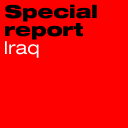 |
|
| ||||||||||||||||||||||||||||||||||||||||||||||||||||||||||||||||||||||||||||||||||||||||||||||||||||||||||||||||||||||||||||||||
 |
|
| ||||||||||||||||||||||||||||||||||||||||||||||||||||||||||||||||||||||||||||||||||||||||||||||||||||||||||||||||||||||||||||||||

|
Britain's dirty
secret David Leigh and John Hooper Thursday March 6, 2003 The Guardian A chemical plant which the US says is a key component in Iraq's chemical warfare arsenal was secretly built by Britain in 1985 behind the backs of the Americans, the Guardian can disclose. Documents show British ministers knew at the time that the �14m plant, called Falluja 2, was likely to be used for mustard and nerve gas production. Senior officials recorded in writing that Saddam Hussein was actively gassing his opponents and that there was a "strong possibility" that the chlorine plant was intended by the Iraqis to make mustard gas. At the time, Saddam was known to be gassing Iranian troops in their thousands in the Iran-Iraq war. But ministers in the then Thatcher government none the less secretly gave financial backing to the British company involved, Uhde Ltd, through insurance guarantees. Paul Channon, then trade minister, concealed the existence of the chlorine plant contract from the US administration, which was pressing for controls on such exports. He also instructed the export credit guarantee department (ECGD) to keep details of the deal secret from the public. The papers show that Mr Channon rejected a strong plea from a Foreign Office minister, Richard Luce, that the deal would ruin Britain's image in the world if news got out: "I consider it essential everything possible be done to oppose the proposed sale and to deny the company concerned ECGD cover". The Ministry of Defence also weighed in, warning that it could be used to make chemical weapons. But Mr Channon, in line with Mrs Thatcher's policy of propping up the dictator, said: "A ban would do our other trade prospects in Iraq no good". The British taxpayer was even forced to write a compensation cheque for �300,000 to the German-owned company after final checks on the plant, completed in May 1990, were interrupted by the outbreak of the Gulf war. The Falluja 2 chlorine plant, 50 miles outside Baghdad, near the Habbaniya airbase, has been pinpointed by the US as an example of a factory rebuilt by Saddam to regain his chemical warfare capability. Last month it featured in Colin Powell's dossier of reasons why the world should go to war against Iraq, which was presented to the UN security council. Spy satellite pictures of Falluja 2 identifying it as a chemical weapons site were earlier published by the CIA, and a report by Britain's joint intelligence committee, published with Tony Blair's imprimatur last September, also focused on Falluja 2 as a rebuilt plant "formerly associated with the chemical warfare programme". UN weapons inspectors toured the Falluja 2 plant last December and Hans Blix, the chief inspector, reported to the security council that the chemical equipment there might have to be destroyed. But until now, the secret of Britain's knowing role in Falluja's construction has remained hidden. Last night, Uhde Ltd's parent company in Dortmund, Germany, issued a statement confirming that their then UK subsidiary had built Falluja 2 for Iraq's chemical weapons procurement agency, the State Enterprise for Pesticide Production. A company spokesman said: "This was a normal plant for the production of chlorine and caustic soda. It could not produce other products". The British government's intelligence at the time, as shown in the documents, was that Iraq, which was having increasing difficulty in obtaining precursor chemicals on the legitimate market, intended to use the chlorine as a feedstock to manufacture such chemicals as epichlorohydrin and phosphorous trichloride. These in turn were used to make mustard gas and nerve agents. Paul Channon, since ennobled as Lord Kelvedon, was last night holidaying on the Caribbean island of Mustique. He issued a statement through his secretary, who said: "He can't object to the story. So he's got no comment." Special report Iraq Hans Blix's report to the UN 14.02.2003: Full text: Hans Blix's briefing to the security council Full text: Mohammed el-Baradei's briefing to the security council Audio Hear Hans Blix's report to the UN security council (23 min) Interactive guides Click-through graphics on Iraq Voices on Iraq Read our collection of 30 exclusive interviews Comment and analysis Comment and analysis on Iraq History Iraq: archive special Explained 09.12.2002: Weapons inspections 04.10.2002: War with Iraq The weblog Weblog special: Iraq News guide Iraq Key documents 05.02.2003: Full text of Colin Powell's speech to the UN Sites visited by the UN weapons inspectors 20.12.2002: Colin Powell's statement on Iraq's weapons declaration 20.12.2002: UN security council resolution 1441 on Iraq UK government dossier on human rights abuses in Iraq (pdf) UK government dossier on Iraq's military capability (pdf) In pictures Saddam Hussein's inner circle 10 years after the Gulf war Anti-war movement Special report: the anti-war movement 28.01.2003: Guide to anti-war websites Useful links Arab Gateway: Iraq briefing Middle East Daily Campaign Against Sanctions on Iraq Iraq sanctions - UN security council UN special commission on Iraq Printable version | Send it to a friend | Read it later | See saved stories | ||||||||
 |
 |